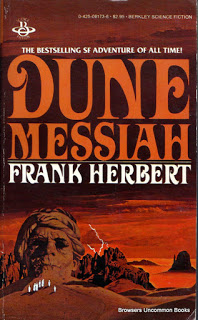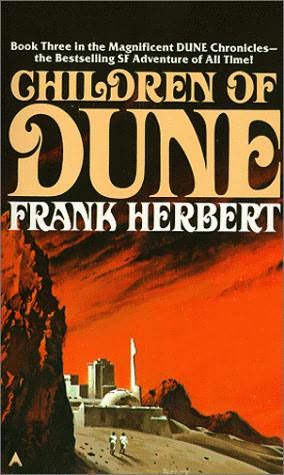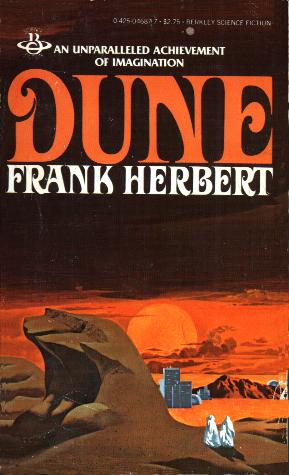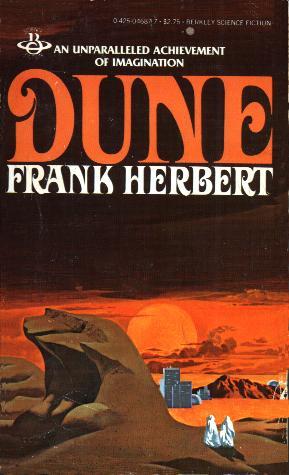It’s no secret that big-budget shows, with a shortened (10 episode or so) season, are all the rage right now. Of course the trend is exemplified by Game of Thrones, but we’ve seen it in other historical dramas like Rome, The Tudors, and The Borgias, and with more sci-fi/fantasy/horror fare such as The Walking Dead and American Horror Show. SyFy just announced that not only are they doing Childhood’s End as a miniseries, but 3001: The Final Odyssey is also coming to the small screen. Plus American Gods. Plus a bunch of others.
I submit that there’s a series of novels that would make every bit as compelling a series as Game of Thrones. Frank Herbert’s Dune novels.
I’m not talking about the prequel novels by his son (which are pretty awful; some might go even further in their… dislike of them), but the original novels. Dune (1965), Dune Messiah (1969), Children of Dune (1976), and God Emperor of Dune (1981). I omit Heretics of Dune (1984) Chapterhouse: Dune (1985) which pretty much take the series in a completely different direction. The first four books (many would argue – with some justification – that the first three books are sufficiently self-contained to not need the fourth, but I disagree for a variety of reasons).
 The comparisons with Game of Thrones are stunning, but I submit Dune has an even grander scope (the entire universe, and spans 3,500 years if you include God Emperor), deals with questions of history, civilization, religion, the nature of time and prophecy, ecology and the economics of scarcity, and more. Yet it is also firmly grounded in the interrelationships between, and growth of, the characters; at its heart it is the story of a family doomed to become those things they hate the most.
The comparisons with Game of Thrones are stunning, but I submit Dune has an even grander scope (the entire universe, and spans 3,500 years if you include God Emperor), deals with questions of history, civilization, religion, the nature of time and prophecy, ecology and the economics of scarcity, and more. Yet it is also firmly grounded in the interrelationships between, and growth of, the characters; at its heart it is the story of a family doomed to become those things they hate the most.
The political maneuvering is as intricate as anything you’ll see in King’s Landing. It begins with the feud between the noble houses of Atreides and Harkonnen, fueled by the desire of the Padishah Emperor to remove Duke Leto Atreides as a rival for power. But there are layers upon layers of complexity as new centers of power are revealed – the Bene Gesserit sisterhood, the Fremen, the Spacing Guild, the Bene Tleilaxu, and later Fremen factions and renegades, a new Priesthood of Muad’dib, the deposed (formerly Imperial) House Corrino, and much more besides. Plus there are factions within factions and individuals shift from one to another. Fans of that sort of intricate plotting would be in hog heaven.
 There are also a lot of opportunities for violence and war. One of the conceits of the novels is the artificial constraints on technology. Thinking machines are outlawed, and bladed weapons are back in vogue because of the adoption of personal shields that block conventional bullets and which blow up in contact with a laser. So combat is much more personal, hearkening back to something you might see in a more medieval-esque setting (ahem). There are wars, battles large and small, duels, gladiatorial combats, assassinations, and more.
There are also a lot of opportunities for violence and war. One of the conceits of the novels is the artificial constraints on technology. Thinking machines are outlawed, and bladed weapons are back in vogue because of the adoption of personal shields that block conventional bullets and which blow up in contact with a laser. So combat is much more personal, hearkening back to something you might see in a more medieval-esque setting (ahem). There are wars, battles large and small, duels, gladiatorial combats, assassinations, and more.
There’s relatively little sex or nudity to be had, but the opportunities are certainly there (just as the writers for GoT managed to insert quite a bit where I don’t remember reading about it in the novels). Paul and Chani, Alia and various people, Feyd-Rautha, and others. It could certainly be included if that was deemed a requirement. (Personally I don’t think it would be, but I can’t speak for everyone, let along for what a network would want to see.)
 Now, it is true that Dune has already been tackled twice on the screen. Once as David Lynch’s famous flop, and again by the SciFi channel as a pair of three-part series. Personally I like them both, although both have enormous flaws. The visuals in the Lynch version were great (with some notable exceptions like the disease-scarred Baron Harkonnen), but Sci-Fi cleaved closer to the novels in terms of plot and took a lot more time to develop the relationship between the Atreides and the Fremen. Both versions had their good and bad casting choices, but the Sci-Fi version was limited in terms of budget and it shows in a lot of scenes.
Now, it is true that Dune has already been tackled twice on the screen. Once as David Lynch’s famous flop, and again by the SciFi channel as a pair of three-part series. Personally I like them both, although both have enormous flaws. The visuals in the Lynch version were great (with some notable exceptions like the disease-scarred Baron Harkonnen), but Sci-Fi cleaved closer to the novels in terms of plot and took a lot more time to develop the relationship between the Atreides and the Fremen. Both versions had their good and bad casting choices, but the Sci-Fi version was limited in terms of budget and it shows in a lot of scenes.
I foresee a series that goes at least four seasons, possibly five. You could at least two seasons out of the first book, possibly three. It could be broken up in two ways:
- Arrival of the Atreides on Arrakis through the destruction of the Atreides by the Emperor/Harkonens.
- Atreides merge with the Fremen through the Fremen attack on the Emperor and start of the Great Jihad.
- Arrival of the Atreides on Arrakis through the destruction of the Atreides by the Emperor/Harkonens.
- Atreides merge with the Fremen through about the middle of the Fremen war against the Harkonnens. Includes lots of scenes of the war that are glossed over in the book.
- Finish the Fremen war against the Harkonnens through the Fremen attack on the Emperor and start of the Great Jihad.
The remaining books would each be good for a season. So there’s a five, maybe six season show, with no chance that the show will overtake the books. If they managed to maintain a level of quality similar to GoT or Vikings, you couldn’t tear me away from the television.











I'm with you on nearly every point, except that I also like the last two novels (and wish that someone besides Anderson had continued the story from there).